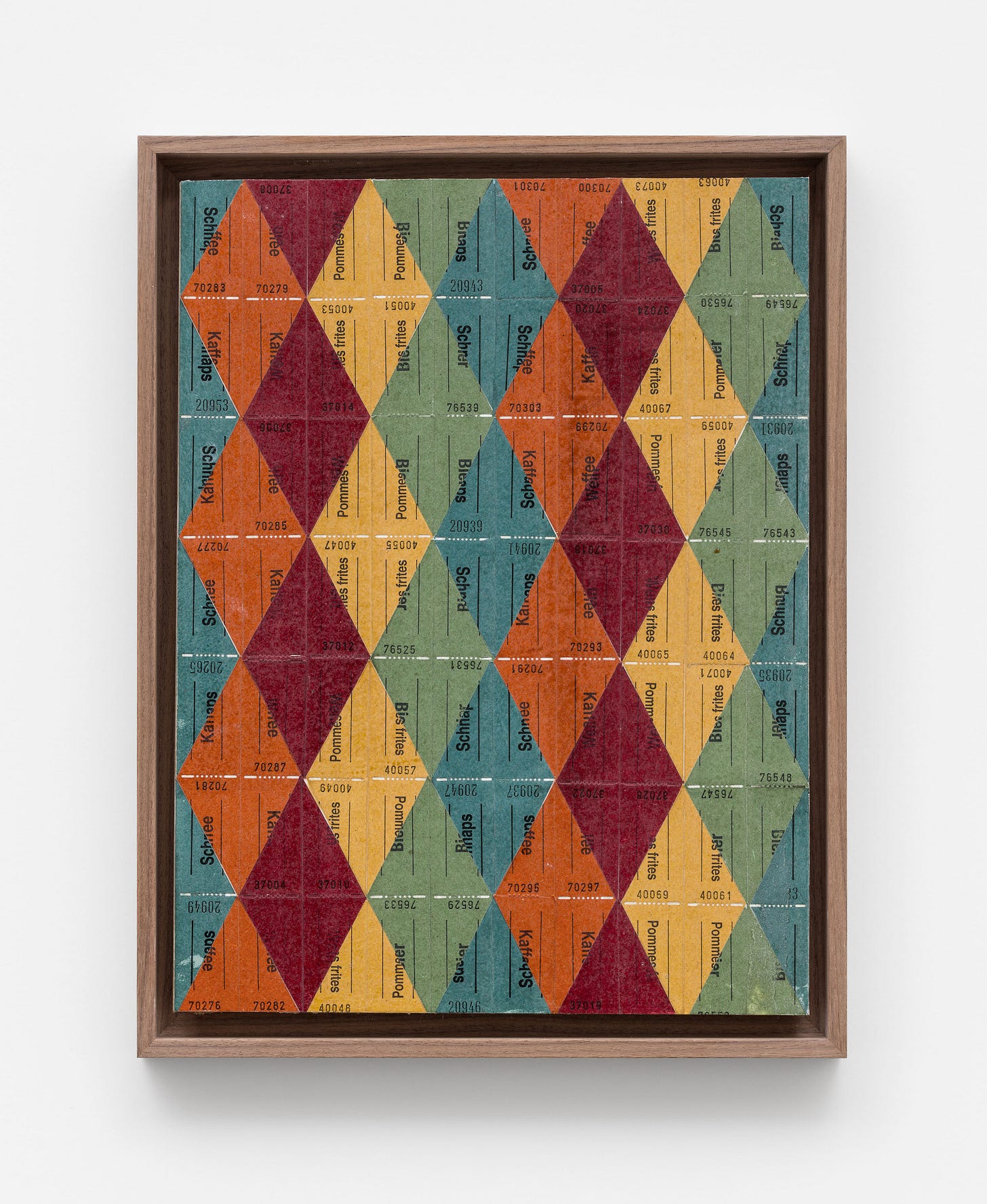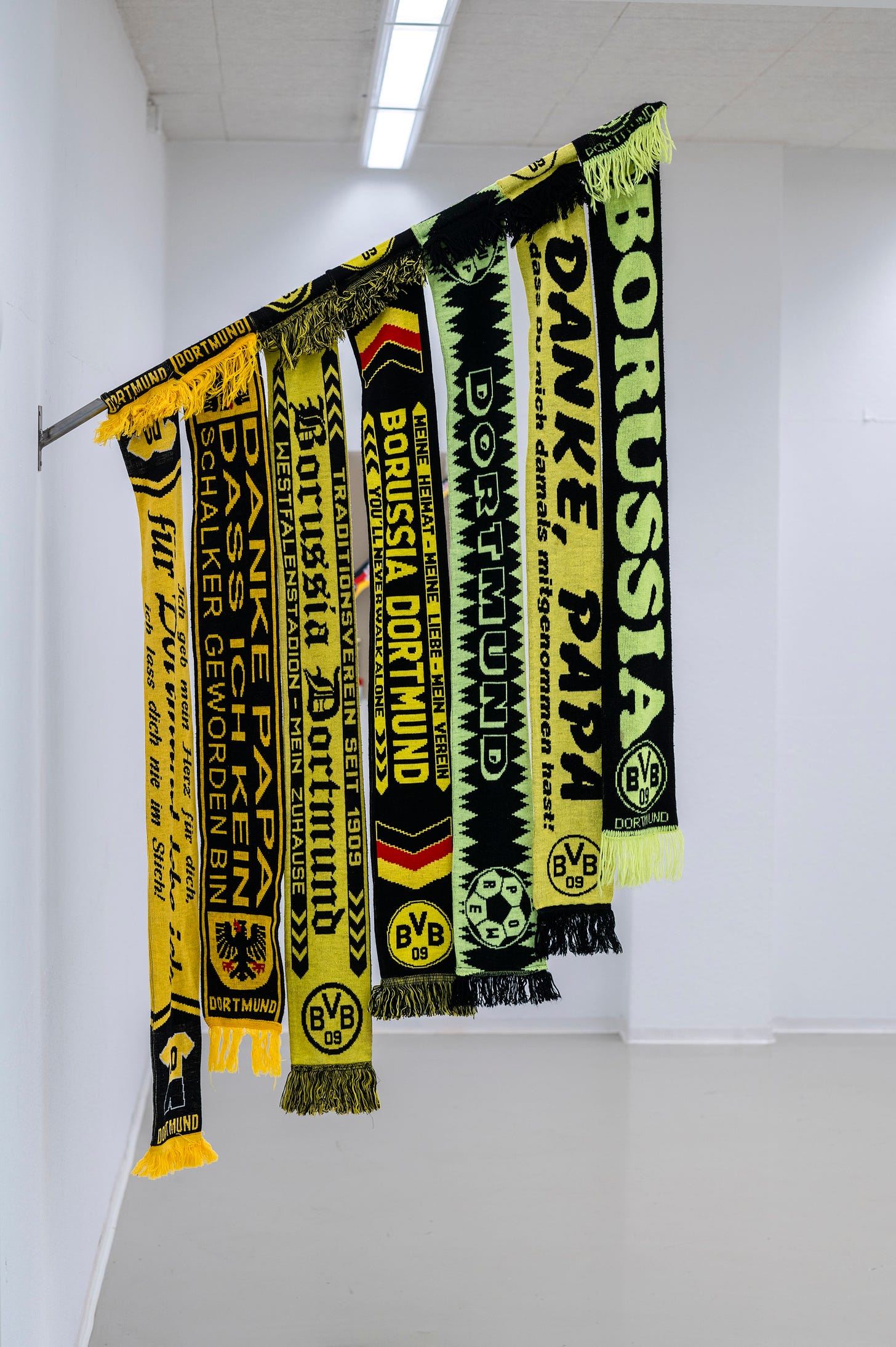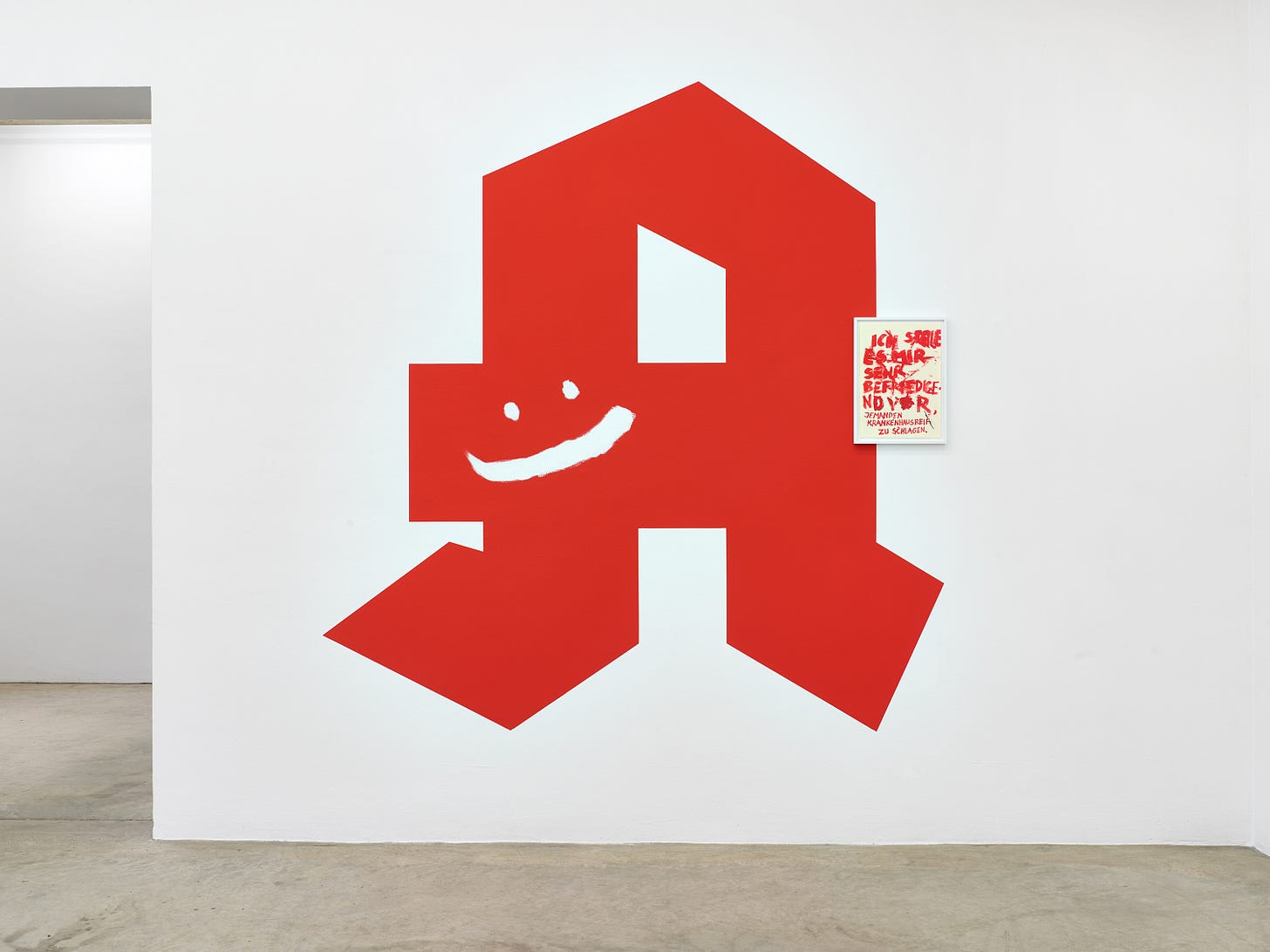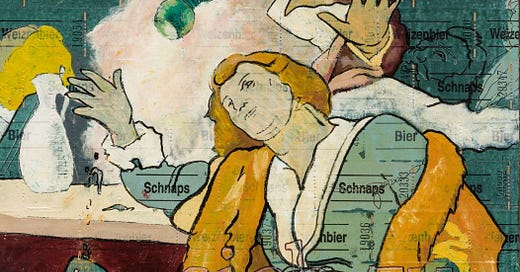#4 In the studio with Jody Korbach
In her Düsseldorf studio, we had a chat about her interim teaching experience at the art academy in Nuremberg, soccer hooligans, and self-ironic local patriotism.
February 28, 2024. I huffed and puffed climbing the stairs to her studio. Stairs really are my enemy. Jody (Millennial, German) was already standing in the door, greeting me as I mastered the last steps. She shared her space with another artist who wasn’t there at the moment. “I’m very much a social person, I don’t like working all by myself from morning to night,” Jody told me as we sat down.

I first saw her art in her solo show at MARTINETZ during DC Open last year: Frowning clown faces painted on top of meticulously arranged food stamps, puns and sayings in haunting gothic script, German brand logos twisted into parodies, shooting club badges sewn on rugs.
Jody humorously pulls together what’s rowdy and stuck-up about German identity without pointing fingers at others. This is about us, too! We are the good Germans, the chill and woke Germans, the self-aware Germans, I-know-what-Grandpa-did Germans. Not those Nazi Germans, the bad racist Germans, the always problematic Germans, the fights-at-the-family-function Germans. Them and us? Worlds apart…Right?
The following conversation was edited for clarity.
JB: What was it like for you to teach in Nuremberg? Must be a huge switch from making art to going aight, show me what you’ve been working on.
JK: I was so excited! I’d given a presentation a year earlier and they remembered me. They needed someone on an interim basis, so they asked me. I’ve always wanted to teach. I thought I could give them certain input, but ran into typical academic structures. It was inspiring to see my students try out materials, feeling no fear of failure.
JB: And how did you come to study in Düsseldorf?
JK: I guess just ego and arrogance.
JB: LOL
JK: I thought Düsseldorf and Berlin were the biggest art academies. I was from Dortmund, and Düsseldorf was just about an hour away. I thought the academy there had the best reputation. I didn't even look up who was teaching there, just followed the school's name. I was extremely proud when I got in and hella arrogant at the beginning. I didn’t even go to the Rundgänge of other schools until after graduation. I've always liked to make fun of the other academies. I still do now, but it’s harmless, lighthearted gossip. However, I was considering dropping out a few times…
JB: Why did you want to quit?
JK: I strongly believed in art being something great and uncorrupted, but then I realized it’s also a business. The art world operates on the same logic as any market—money, connections, and keeping certain thoughts quiet not to piss off the wrong people. I thought, shit, do I want this? I went through the whole what-the-fuck-is-going-on-quarterlife-crisis, wondering whether the premise of my studies was legit.
JB: Which would be?
JK: That art is free. That I am free as an artist. That if you're good, you get picked up after the academy. The gallerist says you make great art, I'll pick up pictures here once a month and bring you a paycheck. And don’t worry bout the whole social and publicity stuff, I’ll take care of that. But in reality, it’s networking, it’s reaching out, it’s a shitload of effort. Can I do that? Do I want to?
That’s why I founded the soccer club Eiskeller Export. I didn’t feel like I belonged at the academy, so I embraced that uncertainty and turned it into radical, unconditional devotion. Just the way soccer fans love their club regardless of its performance.
JB: Did you have proper hooligans?
JK: We were the hooligans, and we went all the way. I was fascinated with fan culture, the aggressive kind. It tied back into my local patriotism and the delusional conviction that I’m at the best academy, insulting others to the bones. We had fan chants and a whole lot of borderline behavior.

But we weren’t the first soccer club at the academy, the first team got together in the nineties. Eiskeller Export was a concept that slipped into something real. The name was made up of the street the academy is located on, Eiskellerstrasse 1, and the beer brand, Dortmund Union Export. It was the cheapest thing we were chugging. And I happen to be from Dortmund, so that's an even better fit. I didn't come up with everything on my own, though. We all did it together.
JB: You founded quite a few projects, there was the Schützenkorps Europa…
JK: That was after I graduated. We don’t really have that shooting club culture in the Ruhr area. You know, this whole celebration of military culture, parades, historical reenactments, and shooting competitions. I came to the Rhineland and was like, what the fuck is this? I was still a naive Europe fan back then: It's cooler than nationalism, Europe instead of Germany, yay!
This illusion shattered quickly but a new idea was born: if shooting clubs are national and Europe is international, let's make the Schützenkorps Europa and defend this idea of community, tradition, and values. Obvioulsy, “European values” is just as hollow a phrase as “German Leitkultur” or whatever. And empty adherence to traditions and the belief that values are fixed and untouched by time is nonsense. But equally, we ask ourselves, what are European values if politics doesn't adhere to them? What is this inviolable human dignity in Paragraph 1 of the European Charter of Fundamental Rights? At what point is human dignity compromised? Where do you draw the line? I enjoy this project a lot, it’s constantly evolving.
JB: Do you accept new members?
JK: Definitely. Initially, many people misunderstood Schützenkorps Europa as an ironic take on shooting clubs, as if we were just making fun of them. I identify a lot with the groups I'm involved with. I find soccer boring, but I relate to the aggression and passion of soccer ultras. Shooting clubs are kinda cringe and the culture has a big problem with sexism and racism. But it’s also about finding comfort in belonging, which ties into concepts of Heimat and group identity. I realized that these themes are a red thread in my work. Conservatives talk about "homeland," but I think the left needs to reclaim that space, maybe with a different term.
JB: You mentioned your local patriotism a few times. What does the Ruhrpott mean to you?
JK: It’s hard to say. I didn’t think about it much until I left Dortmund. I happen to vibe the most with people who also come from the Ruhr area. When you enter a new environment, the place you’re from suddenly becomes more saturated. Dortmund feels like this vacuum, precisely because I don't have any feelings attached to it. You can put on local patriotism like a costume and play this card whenever you feel like it.
Dortmund is also soccer. I suddenly become a BVB fan whenever I see other people with the merch. Dortmund is a place of longing for me that has never been fulfilled. Sometimes I wish I could go back to Dortmund and feel something. Though I would probably be sad if Dortmund just didn’t exist one day-
JB: ...Like Bielefeld? [Side note to the non-German readers: It’s an integral part of German culture to deny that Bielefeld is a real place. Nobody knows why.]
JK: I saw that one coming. You know I was born in Bielefeld, right?
JB: Sorry I just had to, you know I had to. By the way, you mentioned costumes earlier. Are you into carnival?
JK: I think that's coming next. I've always loved dressing up, but it’s only fun when it stands out, when it's not appropriate. Dressing up when everyone is dressed up anyway is whack. I would even go so far as to accuse carnival of forced cheerfulness, similar to shooting club culture. This fake freedom in carnival is to me a super bourgeois lie.
You feel wild once a year, but you weren't wild and then you go back to business as usual. Unlike shooting or soccer, there's a supposed irony built in. So what can I add as an artist? A double joke? A triple joke? But I’m growing more curious about the culture. I wouldn't rule out the possibility that it might somehow find its way into my art.
JB: The Rhineland carnival was historically subversive as it resisted French rule, but what you said about fake freedom reminds me of the Venetian carnival which was an integral part of the ruling system: All the societal classes get a wildcard for a week, and afterward everyone is happy to return to their place.
JK: It’s like letting the dogs out for a bit, you and them knowing you’ll put them back on the leash. Unlike carnival, the shooting club community doesn't claim subversion, but actually the opposite, making sure that the status quo is maintained. It’s just that I don't know any big anarchists who are real carnival fans. At best only to have an excuse to get hella drunk. You surely can make fun of society needing to feel free in such a shallow way once a year. Gisela from accounting might feel free at the carnival, but what about her feeling liberated from her job or something? I wouldn’t want to judge individuals so much, though. I don't blame Gisela for not starting the revolution on her own.
JB: How did you grow up and how did you get into art?
JK: My mother is a documentary filmmaker. I grew up with the idea that art is valuable and that studying it was as valid as getting a math degree. But because we struggled financially, I initially wanted a secure 9-to-5. In my late teens, I realized what that would mean and chose freedom instead, though I’m wary of reducing my experience to just class-based identity. I'm afraid of falling into white identity politics, taking the easy route because class is just so easy to apply to my biography. I think it's dangerous to look for a niche where you're a minority yourself or have somehow experienced discrimination and then play it like that.
JB: Speaking of politics, you have this Instagram account, @1000jahrecdu [1000 years CDU]. What year do you count down from?
JK: I’m counting down from 1945, when the Christian Democratic party became legal again, reflecting how entrenched it is in Germany’s politics. Back in the Helmut Schmidt days, people used to say that he was in the wrong party, he could easily be a CDU politician. The CDU has changed, but there's a red thread running through German politics—a conservatism still present across the political spectrum.
For me, this project is a form of self-reflection: Where do I abandon my anarchist ideas? Where do I adopt conservative values? Nobody wants to die in precarity, so at some point you go ah shit, how do I get a Bausparvertrag [Building savings contract]?

JB: Who do you make art for? Is it for Germans to reflect on where they stand? Is it for people who are confronted with German violence?
JK: Ideally, for everyone, but probably most for Germans. It’s frustrating, like preaching to the choir. I don’t want my art to just reinforce the same ideas, especially for leftists. I’m aware that I’m not the victim, I’m more of a perpetrator in the sense that I'm already part of this majority society with my privileges. My goal is to spark discussion and break up societal complacency so that our society can become a home for everyone.
JB: We live in a society… But I wouldn’t say you’re preaching to the choir, though…
JK: I wouldn’t want my art to be just another convo between white folks. At the very most I claim that my art forces my peer group into discussion which hopefully changes something in the bigger picture. My expectations of art are idealistic, but I don't know if they have anything to do with reality. I wonder if people who understand my work are already politically engaged. A right-winger, for example, wouldn’t feel addressed. I see myself more as a cheerleader, encouraging discussion, offering a sense of belonging. Political art is not activism, not a substitute for activism.
Maybe I make art for my guilty conscience. I don't know. I don't think you can get out of that. But I would find it presumptuous to name a specific audience. Or maybe I'm too much of a coward to name one, because the moment you say who you're doing it for, you must follow through. So maybe it's more like group therapy.
Jody currently exhibits at the group show SOFT TARGETS until November 31, 2024, at MARTINETZ.
Thank you for having me, Jody! If you do not already, make sure to follow @jodykorbach on Instagram. If you liked our convo, leave me a lil heart and comment. And don’t forget to share!
See you soon!!!
Jennifer
The Gen Z Art Critic





